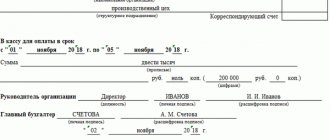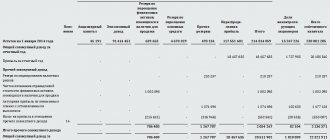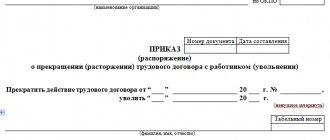General provisions
1.1. This employment contract (hereinafter referred to as the contract) regulates labor and other directly related relations between the Employee and the Employer.
1.2. Work under this agreement is the main place of work (or part-time) for the Employee.
At the request of the Employee, the Employer has the right to allow him to work under another employment contract in the same organization in a different profession, specialty or position outside the normal working hours as part-time work.
An employee has the right to conclude an employment contract with another employer to work on an external part-time basis, with the exception of cases provided for by the Labor Code of the Russian Federation or other federal laws.
Work outside normal working hours cannot exceed four hours per day and 16 hours per week.
1.3. The Employee's place of work is [indicate the short name and address of the organization, the name of the structural unit, for example, legal department, location of the office premises].
1.4. The start date of work is [day, month, year].
1.5. An employee is hired as a lawyer.
1.6. The Employee is assigned the following office equipment, equipment and other material assets, for the safety of which he is personally responsible: [indicate the name and identifying characteristics of the office equipment].
1.7. Characteristics of working conditions: [fill in as necessary].
1.8. The employee reports directly to [specify position, for example, director, head of the legal department, head of the legal department, etc.].
1.9. By order of the Employer, the Employee may be sent on business trips with reimbursement of expenses incurred in the amounts established by law, and subject to compliance with labor legislation that defines guarantees for employees when sent on business trips.
1.10. When concluding this agreement, the Employee is subject to a probationary period of [value] calendar months (the probationary period cannot exceed three months), i.e. from [date, month, year] to [date, month, year].
If the test result is unsatisfactory, the Employer has the right to terminate this contract before the expiration of the test period by notifying the Employee in writing no later than three days in advance, indicating the reasons that served as the basis for recognizing him as having failed the test. The Employer's decision The Employee has the right to appeal in court.
If the test result is unsatisfactory, this agreement is terminated without taking into account the opinion of the relevant trade union body and without payment of severance pay.
If the probation period has expired and the Employee continues to work, then he is considered to have passed the test and subsequent termination of this agreement is permitted only on a general basis.
If during the probationary period the Employee comes to the conclusion that the work offered to him is not suitable for him, then he has the right to terminate this contract at his own request by notifying the Employer in writing three days in advance.
1.11. The employee is subject to all types of compulsory social and medical insurance in the manner and under the conditions established for employees by the legislation of the Russian Federation.
back to contents
General requirements
The mandatory details of the contract are listed in Art. 57 Labor Code of the Russian Federation. These conditions must be contained therein:
- place of work. The contract must provide for a specific address for the implementation of obligations under the contract;
- listing of responsibilities, indication of a specific position. In this case, this is the position of a lawyer and the duties of a lawyer. Specifics can be stated in job descriptions, but the agreement must refer to this fact;
- date of commencement of activity at the enterprise;
- working conditions. In accordance with Federal Law-426, their special assessment must be carried out, in this case it is necessary to refer to the special labor assessment card, indicate its number and a specific class. If a workplace is being organized, general conditions can be specified. Also, according to the rules of Art. 16 Federal Law 426, if similar workplaces are discovered, an assessment can be carried out in relation to 20 percent of them. The result of the assessment applies to all others. In this case, it is enough to indicate that they comply with the standards;
- payment procedure, fee transfer, schedule (at least 2 times a month), method;
- work and rest schedule (preferably, if possible, indicating specific hours or rules for determining the schedule);
- social insurance obligations;
- the presence of part-time work, if this corresponds to reality.
In addition, the contract must necessarily contain identifying characteristics of the individual and the organization: TIN, full name, details of the document on the basis of which the manager acts, his position and last name, first name, patronymic; passport details, last name, first name, patronymic, passport details.
It is optimal in the very second copy of the employer to indicate that the employee has familiarized himself with all local regulations, instructions, etc. and has received a signature. And also certify that you received the second copy of the agreement in your hands.
Rights and obligations of the Employee and the Employer
2.1. The employee has the right to:
- providing him with work stipulated by this agreement;
— amendment and termination of this agreement in the manner and under the conditions established by the Labor Code of the Russian Federation and other federal laws;
— a workplace that meets the conditions provided for by state standards of organization and labor safety and the collective agreement;
— timely and full payment of wages in accordance with their qualifications, complexity of work, quantity and quality of work performed;
— rest provided by establishing normal working hours, providing weekly days off, non-working holidays, paid annual leave;
— complete reliable information about working conditions and labor protection requirements in the workplace;
— professional training, retraining and advanced training in the manner established by the Labor Code of the Russian Federation and other federal laws;
— association, including the right to create trade unions and join them to protect their labor rights, freedoms and legitimate interests;
— participation in the management of the organization in the forms provided for by the Labor Code of the Russian Federation, other federal laws and the collective agreement;
— conducting collective negotiations and concluding collective agreements and agreements through their representatives, as well as information on the implementation of the collective agreement and agreements;
— protection of one’s labor rights, freedoms and legitimate interests by all means not prohibited by law;
— resolution of individual and collective labor disputes, including the right to strike, in the manner established by the Labor Code of the Russian Federation and other federal laws;
— compensation for harm caused to the Employee in connection with the performance of his job duties, and compensation for moral damage in the manner established by the Labor Code of the Russian Federation and other federal laws;
— compulsory social insurance in cases provided for by law.
The employee also has the right:
— receive from structural divisions and employees of the organization information, information, materials and documents necessary to fulfill the duties provided for in this employment contract;
— represent, in accordance with the procedure established by law, the interests of the organization in government and administrative bodies, other institutions and organizations on legal issues;
— give structural divisions and individual specialists of the organization mandatory instructions on legal issues;
— in agreement with the immediate supervisor, involve experts and specialists in the field of law for consultations, preparation of opinions, recommendations and proposals;
— get acquainted with the documents defining his rights and labor responsibilities, criteria for assessing the quality of performance of official duties;
— submit proposals for management’s consideration to improve work related to the fulfillment of the duties assigned by this employment contract;
— demand from the management of the organization to ensure organizational and technical conditions and execution of the established documents necessary for the performance of labor duties.
2.2. The employee is obliged:
- personally perform the labor function specified in this agreement;
- conscientiously fulfill his labor duties assigned to him by this agreement;
— observe labor discipline and internal labor regulations of the organization;
— comply with labor protection requirements;
— constantly improve your qualifications and professional level;
— treat the Employer’s property with care, including the office equipment and equipment in his use, ensure the safety of the documentation entrusted to him, as well as the property of other employees;
- use equipment and office equipment transferred to him for work correctly and for its intended purpose;
- not to disclose information that has become known to him due to the nature of his activity and relates to a secret protected by law (state, official, commercial and other);
— immediately inform the Employer or immediate supervisor about the occurrence of a situation that poses a threat to the life and health of people, the safety of the Employer’s property;
— work for the Employer after training for at least [indicate the period if the training is supposed to be carried out at the Employer’s expense].
The employee also performs the following job duties:
— carries out the development of the organization’s constituent documents in accordance with the requirements of current legislation;
— ensures state registration of subsidiaries and dependent companies, issues of securities, amendments to constituent documents, as well as amendments to information in the Unified State Register of Legal Entities that are not related to amendments to constituent documents within the time limits established by the legislation of the Russian Federation;
— carries out activities related to maintaining the register of shareholders and coordinates the work on maintaining registers of shareholders in the event that the register of shareholders is maintained by a third-party organization - a specialized registrar;
— determines the legal basis for the activities of the organization’s management bodies (develops regulations on the procedure for holding General Meetings of Shareholders or Members of the Company, on the Board of Directors, on the Management Board, on the Audit Commission, etc.);
— provides legal support for transactions with shares of the organization (or shares in the authorized capital of the organization);
— determines the legal basis for the dividend policy in the organization and coordinates it;
— carries out work on systematic recording and storage of current legislative normative acts, makes notes on their repeal, changes and additions, prepares reference documentation based on the use of modern information technologies and legal reference systems;
— organizes work to provide officials and employees of the organization with laws, regulatory legal documents necessary for them to carry out their labor functions and responsibilities;
— informs the management and officials of the organization about the need to make appropriate changes or cancel the internal acts of the organization due to changes in the legislation of the Russian Federation;
— checks the compliance with current legislation of draft orders, instructions, regulations and other legal documents submitted to the head of the organization for signature;
— checks compliance with the stages of approval of draft documents with responsible employees;
— endorses draft documents, prepares legal opinions on issues arising in the activities of the organization;
— conducts contractual and legal work at the enterprise, namely: develops draft contracts; conducts legal examination of draft agreements submitted by counterparties, draws up protocols of disagreements to agreements; takes measures to resolve disagreements on draft agreements; provides notarization or state registration of certain types of contracts;
— develops the terms of collective agreements and industry tariff agreements, and also takes part in the consideration of issues regarding the organization’s receivables and payables;
— conducts claims work in the organization, namely: ensures registration of claims received from counterparties and their consideration; prepares responses to received claims and makes draft decisions on satisfaction or refusal to satisfy received claims; prepares claims to counterparties, sends them to counterparties and monitors the satisfaction of claims sent to counterparties;
— conducts claims work: takes measures to comply with the pre-trial procedure for resolving disputes; prepares statements of claim and materials and submits them to the courts in accordance with jurisdiction; studies the materials of consideration of cases in courts regarding claims against the organization; ensures maintenance of a data bank on claim work; represents the interests of the organization in courts of general jurisdiction, magistrates' courts and arbitration courts in the manner prescribed by the current legislation of the Russian Federation;
— conducts study, analysis and generalization of the results of consideration of claims, consideration of cases in courts, the practice of concluding and executing business contracts in order to develop proposals for eliminating identified shortcomings and improving the economic and financial activities of the enterprise;
— prepares applications, statements and other documents to obtain licenses and permits necessary for the organization’s activities;
— takes part in the development of documents related to issues of ensuring the safety of the organization’s property (agreements on full financial liability; instructions establishing the procedure for the receipt and acceptance of material assets in the organization, their storage, accounting and movement; instructions for accounting for the release and release of finished products);
— monitors compliance with the law by the organization’s personnel service when dismissing and transferring employees, imposing disciplinary sanctions on them, etc.;
— represents the interests of the organization during inspections carried out by state control and supervisory authorities for the purpose of legal control over compliance with the procedure established by law for conducting procedural actions, the validity and correctness of conclusions and registration of inspection results;
— represents the interests of the organization in state supervisory authorities authorized to consider cases of administrative offenses; prepares and sends complaints against the actions of officials of state supervisory authorities, against administrative penalties unlawfully imposed on the organization or officials;
— prepares, together with other structural divisions of the organization, materials on theft, embezzlement, shortages, production of substandard (including non-standard and incomplete) products, violation of environmental legislation and other offenses for transferring them to the arbitration court, court of general jurisdiction, investigative bodies, carries out accounting and storage of pending and completed court cases;
— provides legal support for maintaining the organization’s archive.
2.3. The list of other labor rights and obligations of the Employee is determined by legislation, other regulatory legal acts, the Personnel Regulations, the job description of a lawyer approved by [position of the head of a permanent executive body and short name of the organization] [date, month, year], local regulations of the Employer, not contrary to the labor legislation of the Russian Federation.
2.4. The employer has the right:
— change and terminate this agreement in the manner and under the conditions established by the Labor Code of the Russian Federation;
— conduct collective negotiations and conclude collective agreements;
— encourage the Employee for conscientious, effective work;
— demand from the Employee the performance of his labor duties and careful attitude towards the property of the Employer and other employees, compliance with the internal labor regulations of the organization;
— bring the Employee to disciplinary and financial liability in the manner established by the Labor Code of the Russian Federation and other federal laws;
— issue local regulations;
- create associations of employers for the purpose of representing and protecting their interests and join them.
2.5. The employer is obliged:
— comply with laws and other regulatory legal acts, local regulations, terms of the collective agreement, agreements and this agreement;
— provide the Employee with work in accordance with his specialty and qualifications in accordance with the terms of this agreement;
— ensure labor safety and conditions that meet occupational safety and health requirements;
— provide the Employee with the necessary equipment, office equipment, documentation and other means necessary to perform his job duties;
— provide the Employee with equal pay for work of equal value;
— pay the full amount of wages due to the Employee within the terms established by the Labor Code of the Russian Federation, the collective agreement, the internal labor regulations of the organization, as well as this agreement;
— conduct collective negotiations, as well as conclude a collective agreement in the manner established by the legislation of the Russian Federation;
— provide the Employee’s representatives with complete and reliable information necessary for concluding a collective agreement, agreement and monitoring their implementation;
— promptly comply with the instructions of state supervisory and control bodies, pay fines imposed for violations of laws and other regulatory legal acts containing labor law standards;
— consider the submissions of the relevant trade union bodies, other representatives elected by employees about identified violations of laws and other regulatory legal acts containing labor law norms, take measures to eliminate them and report on the measures taken to the specified bodies and representatives;
— create conditions that ensure the Employee’s participation in the management of the organization in the forms provided for by the Labor Code of the Russian Federation, other federal laws and the collective agreement;
— provide for the Employee’s everyday needs related to the performance of his job duties;
— carry out compulsory social insurance of the Employee in the manner established by federal laws;
— compensate for damage caused to the Employee in connection with the performance of his labor duties, as well as compensate for moral damage in the manner and under the conditions established by the Labor Code of the Russian Federation, federal laws and other regulatory legal acts;
- fulfill other duties provided for by the Labor Code of the Russian Federation, federal laws and other regulatory legal acts containing labor law standards, collective agreements, agreements and this agreement.
2.6. The rights and obligations of the Employee and the Employer in the field of labor protection are determined by the rules of Section X of the Labor Code of the Russian Federation.
back to contents
Terms of payment
3.1. The Employer undertakes to pay the Employee wages in a timely manner and in full. The Employee's salary is [in figures and words] rubles.
Due to the increase in consumer prices for goods and services, the Employer carries out wage indexation in the following order: [fill in what is required]. (In organizations financed from the relevant budgets, wages are indexed in the manner established by laws and other regulatory legal acts, and in other organizations - in the manner established by the collective agreement, agreements or local regulations of the organization).
3.2. By decision of the Employer, in the event of the Employee’s conscientious performance of official duties and the absence of penalties for violation of labor discipline, the following are established for the Employee:
Option 1: - personal bonus to the official salary in the amount [in figures and words] rubles monthly;
Option 2: - bonus in the amount of [in figures and words] rubles monthly (quarterly);
Option 3: - remuneration based on the results of work for the year in the amount of [in numbers and words] rubles.
3.3. Wages, including bonuses, allowances and other payments of a compensatory and incentive nature, are paid to [specify the place of payment of wages] no later than [value] of the day of each month following the one in which it was accrued, by [specify the method of payment of wages - cash issuance, transfer to the bank account specified by the Employee].
3.4. Payment of wages is made in cash in the currency of the Russian Federation.
3.5. Deductions from wages are made only in cases provided for by the Labor Code of the Russian Federation and other federal laws.
back to contents
Basic information ↑
As in the general case, when employing a professional lawyer on staff of a company, you will need to conclude an employment contract.
As well as establishing a personal file and making appropriate entries in the employee’s work book (Article 65 of the Labor Code of the Russian Federation).
The company may employ a lawyer or his assistant. Moreover, depending on the volume of work, she can choose a main contract or a part-time contract.
For small organizations, the second option seems more acceptable - the salary in this case will be lower (the employee works no more than 4 hours a day) and there will be fewer formalities for registering an employee and providing him with social benefits.
As a rule, an employment contract with a lawyer is drawn up according to general rules. However, some specific conditions of its operation must be enshrined in the document.
Concepts
An employment contract with a lawyer is an official document defining the fact of the emergence of an employment relationship between an organization and a specialist with a specialized legal education, the necessary experience and length of service.
According to its provisions, the employer provides work to the lawyer, and he undertakes to fulfill the duties entrusted to him (Article 56 of the Labor Code of the Russian Federation).
The document is drawn up in two copies and handed over to the participants in the labor relationship, namely:
| To the employee | What is an individual with education and experience in the field of jurisprudence? |
| To the employer | An organization that, due to the specifics of its work, is faced with the need to hire a professional lawyer on an ongoing basis |
An employment agreement with a legal employee may include two types of conditions:
| Mandatory | Contained in any agreement of this kind and change solely by agreement of the parties |
| Additional | Included in the document solely by decision of the parties |
If a permanent lawyer is needed, the contract is concluded on an indefinite basis.
When it comes to temporary work (up to 2 months) or seasonal activity, a fixed-term employment contract is formed.
General scheme for concluding an agreement
Concluding an employment contract with a lawyer is a very significant event for the company.
Since with an employee who is well versed in the intricacies of labor legislation, it is best to draw up a fairly detailed document
It must disclose in detail the rights and obligations of the parties in order to insure itself against possible labor disputes.
When forming an employment agreement with a legal specialist, it is important to take into account the following important nuances:
| Firstly | There is no standard set of rights, obligations, powers for lawyers of organizations - they are determined by the specifics of the business |
| Secondly | Despite the need to detail the employment relationship with the employee, you should not overfill the employment contract with unnecessary details - all clarifying points can be written down in a local regulatory legal act (for example, in a job description or regulation on the work of the legal department), and then refer to it directly in the employment contract. agreement (Article 8 of the Labor Code of the Russian Federation) |
It is extremely important to know that the norms of any local regulatory act of the company should not contradict the provisions of the Labor Code of the Russian Federation and worsen the position of the legal employee.
This is interesting: Which entries reflect the accrual of dividends in 2019
In general, in his work, an employee of the legal department must be guided by general labor rules, instructions, labor safety standards and the current work schedule.
The legislative framework
Russian labor legislation does not offer any specific legal acts or provisions regulating the activities of hired legal workers.
Relations with an employee-lawyer will be regulated by the rules presented in Chapter 10 of the Labor Code, namely:
| 57 | Contains a description of the structure, specifics and parties to the contract, as well as their role in labor relations |
| 58—59 | Consider the terms of concluding an employment contract, and also determine the possibilities of drawing up a fixed-term contract |
| 60.1, 60.2 | Describe special options for labor relations, including the procedure for performing duties not specified in the contract, and also indicate the specifics of the work of part-time workers and the procedure for their registration |
| 61—62 | Establish the procedure for the validity of the employment contract and the documents necessary for its conclusion |
| 63—64 | Present the main conditions for concluding an employment contract, and also list the key guarantees of the employee |
| 67 | Describes the forms of employment contracts permitted by law |
It is important to take into account the nature of the lawyer’s work - when hiring him to the organization’s staff (opening a personal file, making an entry in the work book), an employment contract is concluded.
If the employer receives the necessary legal advice from a lawyer, then we will be talking about a civil agreement.
The latter is subject to regulation by civil rather than labor legislation.
Work and rest schedule
4.1. The employee is assigned the following length of the working week [enter as required] (five days with two days off, six days with one day off, work week with days off on a sliding schedule).
4.2. Weekends: [enter as required] (specify).
4.3. Option 1. The employee is provided with a flexible working time regime, in which the beginning, end and duration of the working day are determined by agreement of the parties.
The Employer ensures that the Employee works the total number of working hours during the accounting period:
A) [meaning] hours per day;
B) [meaning] hours per week;
B) [meaning] hours per month.
4.3. Option 2. The employee is given an irregular working day.
The normal working hours for an Employee are set to [value] hours per week.
The duration of daily work (shift) is [value] hours.
The start time of work is [value] hours.
The end time of work is [value] hours.
Time of breaks from work - [enter as required] (specify).
By order of the Employer, if necessary, the Employee may be occasionally involved in the performance of his labor functions outside the normal working hours.
4.4. Work on weekends and holidays is carried out in compliance with the requirements of the labor legislation of the Russian Federation with payment [indicate in what amount].
4.5. The employee is granted an annual basic paid leave with preservation of his place of work (position) and average earnings of [value] calendar days.
4.6. The Employee is provided, by decision of the Employer, with annual additional paid leave of [enter as necessary] calendar days for [insert grounds, for example, for irregular working hours].
4.7. Annual basic paid leave for the first year of work is granted, as a rule, no earlier than six months from the date of conclusion of this agreement.
By agreement of the parties, such leave may be granted to the Employee before the expiration of the specified period.
4.8. Annual paid leave for the second and subsequent years of work can be provided at any time of the working year in accordance with the order of provision of annual paid leave established in the organization.
4.9. With the consent of the Employer, the Employee, upon his written application, may be granted leave without pay, if this does not affect the normal operation of the relevant structural unit of the organization.
The duration of leave without pay is determined by agreement of the parties to this agreement.
back to contents
Features of an agreement with a lawyer
As already mentioned above, the features of an employment contract with a lawyer are primarily related to the specific working conditions of the lawyer in a particular organization. For example, payment terms can be set differently: a lawyer can be paid only a salary, or depending on the lawyer’s performance (for example, the success of judicial work), he can be paid a salary and a performance bonus. A lawyer can work part-time (Chapter 44 of the Labor Code of the Russian Federation) or remotely, outside the location of the employer (Chapter 49 of the Labor Code of the Russian Federation).
At the same time, it is advisable to include in the employment contract with a lawyer a condition on non-disclosure of confidential information of the employer.
employment contract with a lawyer
You can find more complete information on the topic in ConsultantPlus.
Free access to the system for 2 days.
Accountant forum:
6. Duration and grounds for termination of the employment contract
6.1. This agreement is concluded for an indefinite period.
(When concluding an employment contract for an indefinite period, it is allowed not to indicate this circumstance. According to Part 3 of Article 58 of the Labor Code of the Russian Federation, if the employment contract does not stipulate its validity period, then the contract is considered concluded for an indefinite period).
6.2. This agreement comes into force from the moment it is signed by both parties. The employee is obliged to begin performing his job duties on the day established in clause 1.4. actual agreement.
6.3. The contract may be terminated in the manner and on the grounds provided for by the Labor Code of the Russian Federation.
back to contents
Download Employment contract with a lawyer
Download as .doc
Save this document in a convenient format. It's free.
Note! This is just the beginning of the document. You can download the full version using the appropriate link.
Download as .doc
Save this document now. It will come in handy.
You found what you were looking for?
* By clicking on one of these buttons, you help form a rating of the usefulness of documents. Thank you!
Related documents
- Employment contract: samples (Full list of documents)
- Search for the phrase “Employment contract” throughout the site
Documents that may also interest you:
- Employment contract with a seasonal worker
- Employment contract with the chef
- Employment contract with a teaching employee
- Employment contract with nanny
- Employment contract with a medical worker
- Employment contract with an engineer
- Employment contract with an accountant
- Employment contract with a foreign worker (auxiliary worker)
- Student agreement with employee
- Fixed-term employment contract with a foreign citizen
Final provisions
7.1. The terms of this agreement can be changed only by agreement of the parties and in writing.
7.2. The financial liability of the parties to this agreement is applied according to the rules of Section XI of the Labor Code of the Russian Federation.
7.3. If an individual labor dispute arises between the parties, it is subject to settlement through direct negotiations between the Employee and the Employer.
If a dispute that arises between the parties is not resolved through negotiations, then it is resolved in the manner established by the articles of Chapter 60, Section XIII of the Labor Code of the Russian Federation.
7.4. The relations of the parties not regulated by this agreement are subject to the norms of labor law established by the Labor Code of the Russian Federation, other federal laws and other legal acts.
7.5. This agreement is drawn up in two copies: one copy is kept in the Employer’s files, the other is kept by the Employee. Each party has the right, in accordance with the established procedure, to make the number of copies of this agreement required by it.
back to contents







